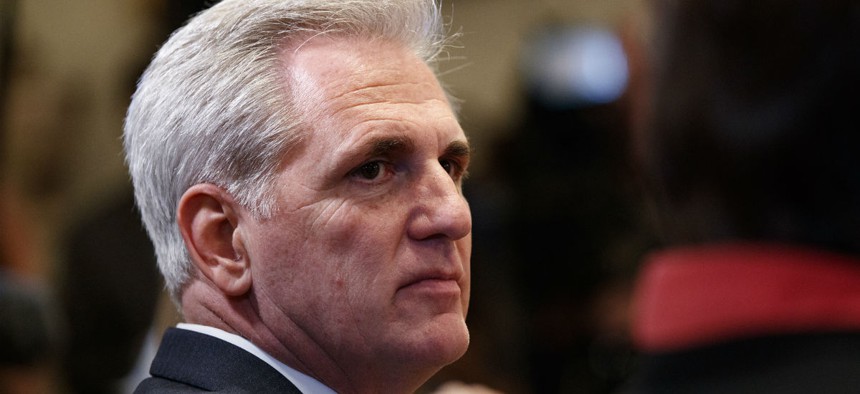SBA Shrugs Off Report That House Majority Leader's In-Law May Have Misused Small Business Contracts
Brother of McCarthy’s wife won $7 million in suspect set-asides for Native American firms, investigative report finds.
The program for contractor set-asides to boost Native American small businesses may have been misused by the brother-in-law of House Majority Leader Kevin McCarthy, R-Calif., according to a Los Angeles Times investigation published on Sunday.
McCarthy himself is not accused of involvement in the arrangement dating back to 1998, when a Bakersfield, Calif., construction firm called Vortex entered the Small Business Administration’s 8A program. Over the nine years of eligibility, the company owned by William Wages, whose sister is married to the majority leader, won $7.6 million in no-bid prime contracts for work at nearby U.S. naval installations by claiming to be part Cherokee.
Several other members of McCarthy’s wife’s family work at the firm, according to L.A. Times reporters Paul Pringle and Adam Elmahrek.
“Wages says he is one-eighth Cherokee,” the reporters wrote. “An examination of government and tribal records by The Times and a leading Cherokee genealogist casts doubt on that claim, however. He is a member of a group called the Northern Cherokee Nation, which has no federal or state recognition as a legitimate tribe. It is considered a fraud by leaders of tribes that have federal recognition.”
McCarthy’s office said it had nothing to add to the story beyond the written response the majority leader sent to the reporters. He described Wages as “a friend and my brother-in-law,” but said they do not discuss his business ventures and that the majority leader—who was elected to Congress in 2006, but was district director for his predecessor in the 1990s—did not help Wages qualify for SBA set-asides. Vortex also qualified as a minority contractor with the California Transportation Department.
The Times found no evidence that McCarthy steered contracts to the company, a point stressed to Government Executive by McCarthy’s staff on Monday.
An SBA spokesman similarly underlined the article’s point that SBA managers of the set-aside program did not require membership in a recognized tribe until 2011. On learning of the Times inquiry, the SBA referred the issue to its inspector general. The agency “takes any potential instance of fraud in any of its programs very seriously and refers such matters to the appropriate authorities for further independent examination and enforcement action where appropriate,” SBA said in a statement.
The listing of Vortex as a Native-American-owned company, however, was quietly removed from the SBA’s public database, the Times noted.
Ethics specialists the Times interviewed called for a probe by the federal Office of Government Ethics, though Congress has its own ethics investigative committees.
Last month, the set-aside program’s certification program for minority contractors came in for criticism in an SBA inspector general report. The report noted that firms owned by Native American tribes, Alaska Native Corporations, Native Hawaiian Organizations and Community Development Corporations have different ownership requirements.
The watchdog said SBA’s Office of Certification and Eligibility “did not consistently identify ineligible firms in the 8(a) program and did not always act to remove firms it determined were no longer eligible for the program,” citing $126.8 million in contracts in fiscal 2017 that should not have been awarded. Also, the IG continued, “SBA did not perform required continuing eligibility reviews when it received specific and credible complaints regarding firms’ eligibility and did not log all complaints.”
The IG made 11 recommendations to SBA’s Office of Government Contracting and Business Development and Office of Field Operations for improving certification, and the SBA fully agreed with seven and partially accepted four.




